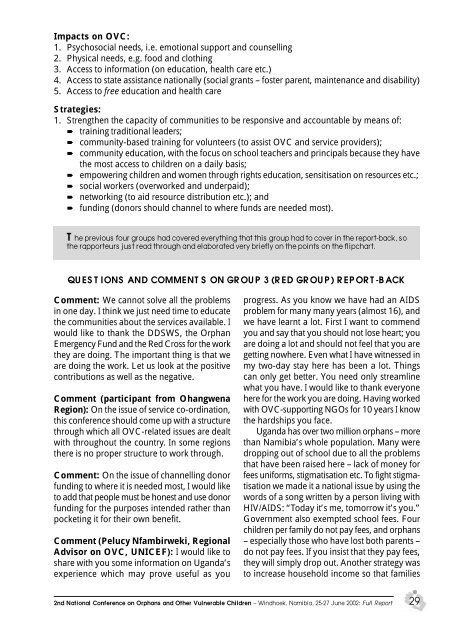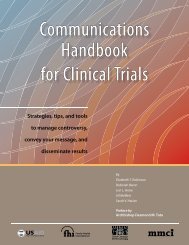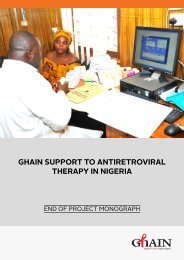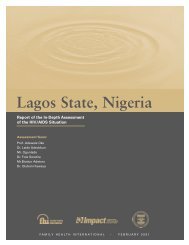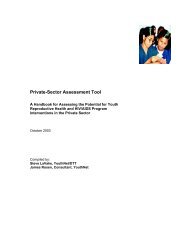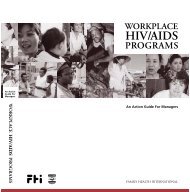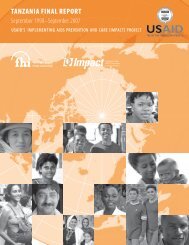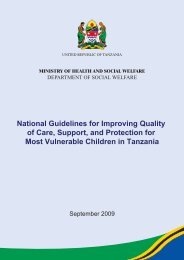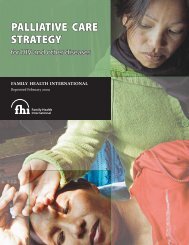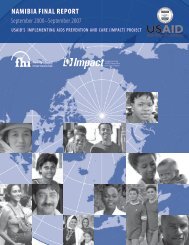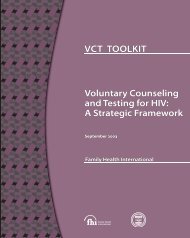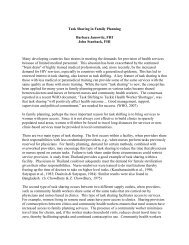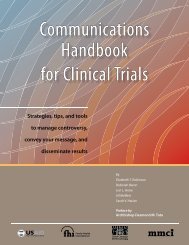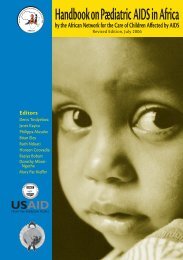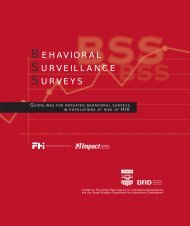2nd National Conference on Orphans and Other ... - FHI 360
2nd National Conference on Orphans and Other ... - FHI 360
2nd National Conference on Orphans and Other ... - FHI 360
You also want an ePaper? Increase the reach of your titles
YUMPU automatically turns print PDFs into web optimized ePapers that Google loves.
Impacts <strong>on</strong> OVC:<br />
1. Psychosocial needs, i.e. emoti<strong>on</strong>al support <strong>and</strong> counselling<br />
2. Physical needs, e.g. food <strong>and</strong> clothing<br />
3. Access to informati<strong>on</strong> (<strong>on</strong> educati<strong>on</strong>, health care etc.)<br />
4. Access to state assistance nati<strong>on</strong>ally (social grants – foster parent, maintenance <strong>and</strong> disability)<br />
5. Access to free educati<strong>on</strong> <strong>and</strong> health care<br />
Strategies:<br />
1. Strengthen the capacity of communities to be resp<strong>on</strong>sive <strong>and</strong> accountable by means of:<br />
training traditi<strong>on</strong>al leaders;<br />
community-based training for volunteers (to assist OVC <strong>and</strong> service providers);<br />
community educati<strong>on</strong>, with the focus <strong>on</strong> school teachers <strong>and</strong> principals because they have<br />
the most access to children <strong>on</strong> a daily basis;<br />
empowering children <strong>and</strong> women through rights educati<strong>on</strong>, sensitisati<strong>on</strong> <strong>on</strong> resources etc.;<br />
social workers (overworked <strong>and</strong> underpaid);<br />
networking (to aid resource distributi<strong>on</strong> etc.); <strong>and</strong><br />
funding (d<strong>on</strong>ors should channel to where funds are needed most).<br />
The previous four groups had covered everything that this group had to cover in the report-back, so<br />
the rapporteurs just read through <strong>and</strong> elaborated very briefly <strong>on</strong> the points <strong>on</strong> the flipchart.<br />
QUESTIONS AND COMMENTS ON GROUP 3 (RED GROUP) REPORT-BACK<br />
Comment: We cannot solve all the problems<br />
in <strong>on</strong>e day. I think we just need time to educate<br />
the communities about the services available. I<br />
would like to thank the DDSWS, the Orphan<br />
Emergency Fund <strong>and</strong> the Red Cross for the work<br />
they are doing. The important thing is that we<br />
are doing the work. Let us look at the positive<br />
c<strong>on</strong>tributi<strong>on</strong>s as well as the negative.<br />
Comment (participant from Ohangwena<br />
Regi<strong>on</strong>): On the issue of service co-ordinati<strong>on</strong>,<br />
this c<strong>on</strong>ference should come up with a structure<br />
through which all OVC-related issues are dealt<br />
with throughout the country. In some regi<strong>on</strong>s<br />
there is no proper structure to work through.<br />
Comment: On the issue of channelling d<strong>on</strong>or<br />
funding to where it is needed most, I would like<br />
to add that people must be h<strong>on</strong>est <strong>and</strong> use d<strong>on</strong>or<br />
funding for the purposes intended rather than<br />
pocketing it for their own benefit.<br />
Comment (Pelucy Nfambirweki, Regi<strong>on</strong>al<br />
Advisor <strong>on</strong> OVC, UNICEF): I would like to<br />
share with you some informati<strong>on</strong> <strong>on</strong> Ug<strong>and</strong>a’s<br />
experience which may prove useful as you<br />
progress. As you know we have had an AIDS<br />
problem for many many years (almost 16), <strong>and</strong><br />
we have learnt a lot. First I want to commend<br />
you <strong>and</strong> say that you should not lose heart; you<br />
are doing a lot <strong>and</strong> should not feel that you are<br />
getting nowhere. Even what I have witnessed in<br />
my two-day stay here has been a lot. Things<br />
can <strong>on</strong>ly get better. You need <strong>on</strong>ly streamline<br />
what you have. I would like to thank every<strong>on</strong>e<br />
here for the work you are doing. Having worked<br />
with OVC-supporting NGOs for 10 years I know<br />
the hardships you face.<br />
Ug<strong>and</strong>a has over two milli<strong>on</strong> orphans – more<br />
than Namibia’s whole populati<strong>on</strong>. Many were<br />
dropping out of school due to all the problems<br />
that have been raised here – lack of m<strong>on</strong>ey for<br />
fees uniforms, stigmatisati<strong>on</strong> etc. To fight stigmatisati<strong>on</strong><br />
we made it a nati<strong>on</strong>al issue by using the<br />
words of a s<strong>on</strong>g written by a pers<strong>on</strong> living with<br />
HIV/AIDS: “Today it’s me, tomorrow it’s you.”<br />
Government also exempted school fees. Four<br />
children per family do not pay fees, <strong>and</strong> orphans<br />
– especially those who have lost both parents –<br />
do not pay fees. If you insist that they pay fees,<br />
they will simply drop out. Another strategy was<br />
to increase household income so that families<br />
<str<strong>on</strong>g>2nd</str<strong>on</strong>g> <str<strong>on</strong>g>Nati<strong>on</strong>al</str<strong>on</strong>g> <str<strong>on</strong>g>C<strong>on</strong>ference</str<strong>on</strong>g> <strong>on</strong> <strong>Orphans</strong> <strong>and</strong> <strong>Other</strong> Vulnerable Children – Windhoek, Namibia, 25-27 June 2002: Full Report<br />
29


